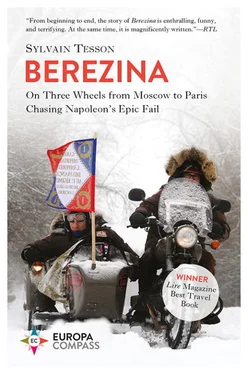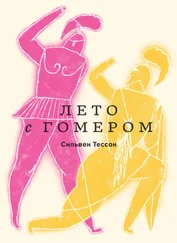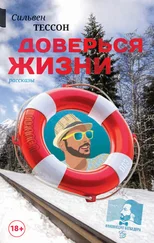Sylvain Tesson
BEREZINA
FROM MOSCOW TO PARIS FOLLOWING NAPOLEON’S EPIC FAIL
Translated from the French
by Katherine Gregor
To my late mother, Marie-Claude Tesson-Millet
“Nevertheless, anything that breathed set forth.”
—SERGEANT BOURGOGNE,
Memoirs
“Extreme abulia! In order to escape from it, I sometimes read the odd book about Napoleon. Sometimes, other people’s courage acts like a tonic.”
—CIORAN,
Cahiers , January 17, 1958
“I’m reading the recollections of Captain Coignet, in which four Frenchmen often triumph over ten thousand Cossacks. Times have changed.”
—PAUL MORAND,
Journal inutile , Volume II
“To fight aloud is very brave,
But gallanter, I know,
Who charge within the bosom,
The cavalry of woe.
We trust, in plumed procession
For such the angels go,
Rank after rank, with even feet
And uniforms of snow.”
—EMILY DICKINSON
BEREZINA: River in Belarus, a tributary of the Dnieper River, 349 miles long. It was the scene of one of Napoleon’s battles against the Tsar’s troops in 1812, during the famous French Retreat from Moscow.
In colloquial French, a bérézina refers to a disastrous situation.
JULY, BAFFIN ISLAND.
SIX MONTHS PRIOR TO DEPARTURE
It’s during a previous journey that the idea of a future one comes to mind. Imagination carries the traveler far from the trap where he’s gotten stuck. While in the Negev desert, he’ll dream of a Scottish glen; in a monsoon, of the Hoggar Mountains; on the west side of the Aiguille du Dru, of a weekend in Tuscany. Man is never happy with his lot, but aspires to something else, cultivates the spirit of contradiction, propels himself out of the present moment. Dissatisfaction motivates his actions. “What am I doing here?” is the title of a book and the only question worth asking.
That summer, every day, we would brush against moaning icebergs. They drifted by, sad and lonely, suddenly appearing out of the fog, ice-cubes in our evening whisky. Our sailboat, La Poule , sailed from fjord to fjord. The summer light, clouded by steam, nourished the Baffin coastline night and day. Sometimes, we would draw alongside the bottom of a two-thousand-foot wall sticking out of the water. Then we would unwind our ropes and go climbing. The granite was compact, so you had to drive the pitons hard. For this we had Daniel Du Lac, the bravest among us. He was comfortable suspended over the water—more so than on the deck of the ship. In opening up the way, he’d dislodge blocks. Rocks would come pouring down onto our backs and slam into the water with the sound of an uppercut into a guilty jaw.
Cédric Gras would follow, lifted by the virtue of indifference. As far as I was concerned, I dreaded coming back down. The atmosphere on board the ship was not cheerful. In the wardroom, everybody would lap up their soup without a word. The captain talked to us as if we were dogs and, in the evening, treated us as his audience. You had to endure his exploits, and listen to him go on with his opinions about the science in which he’d become an expert: shipwrecks. There are such mini-Napoleons about; they generally end up on board ships, the only place where they can reign over empires. His was sixty feet long.
One evening, Gras and I happened to be on the foredeck. Whales were sighing at the prow, swimming lazily, rolling on their sides: the lifestyle of the large. “We should start all over with a real trip, my friend,” I said. “I’m fed up with this Mormon cruise.”
“And what’s a real trip?” he asked.
“It’s a madness we get obsessed with, that transports us into myth; a drift, a frenzy, with History and Geography running through it, irrigated with vodka, a Kerouac-style ride, something that, in the evening, will leave us panting, weeping by the side of a pit. Feverish…”
“Oh?” he said.
“That’s right. Next December, we have to go the Moscow Book Fair, you and I. Why don’t we go back to Paris on a bike with a sidecar? On a beautiful, Russian-made Ural. You’ll be nice and warm in the sidecar, so you can read all day long. I’ll drive. We can leave from Red Square, go straight west toward Smolensk, Minsk, and Warsaw. And you know something else?”
“No,” he said.
“This year marks the two-hundredth anniversary of the Retreat from Moscow,” I replied.
“You’re kidding.”
“Why not give these twenty-five hundred miles as a tribute to Napoleon’s soldiers? To their ghosts. To their sacrifice. In France, nobody gives a damn about the Old Guard. They’re all absorbed by the Mayan calendar. They’re talking about the ‘end of the world’ and don’t realize the world is already dead.”
“You’re not wrong there.”
“I say it’s up to us to salute the Grande Armée . Two hundred years ago, there were guys who dreamed of something other than high-speed internet. They were ready to die just so they could see the Moscow domes sparkle.”
“Except that it turned out to be a slaughter!” he said.
“So? It’ll be a journey to remember. I promise you, we’ll also come very close to a few disasters.”
“Alright then.”
A moment later, Priscilla joined us in the prow. She came on all our trips. With her cases of photos, essential oils, and yoga moves. We told her about our plan. A cyanotic sun was drifting on the horizon. The sea was made of steel. The tail of a large fin whale was whipping this expanse of mercury. Priscilla suddenly said, “Why reconstruct the Retreat exactly?”
On the port side, a whale breathed out a puff of steam. The cloud lingered in the light.
“For the sheer glory of it, darling. For the sheer glory of it.”
A FEW DAYS BEFORE DEPARTURE.
MOSCOW, NOVEMBER
The Moscow Book Fair was a success. Why did the organizers call it a round-table debate when it was a meeting of people who were all in agreement and around a square table? I sat next to Maylis de Kerangal and was intimidated by the beauty of this author of Tangente vers l’est . She spoke of her love for Russia with variety. She snatched away all I would have wanted to say. Her eyes were far apart, a sign of superior people. She was talking about her journey on the Trans-Siberian Railway. I wished I could have been on the train with her, serving her tea, carrying her bags, reading her Boris Godunov in the evening to help her fall asleep.
Gras and I were trying to persuade our audience of the necessity to recreate the itinerary of the Retreat from Moscow. Petrified by Maylis, not quite knowing our stuff, we kept passing the buck to each other. We must have looked like Flaubert’s characters Bouvard and Pécuchet.
“Napoleon may have been a bloodthirsty monster—” I began.
“—but we must admit that in terms of our administration, our land registry, our legal system—” Gras continued.
“—we owe him everything,” I concluded authoritatively.
“Not a day goes by in France when we don’t come across regulations sprung out of his brain,” Gras said.
Читать дальше














